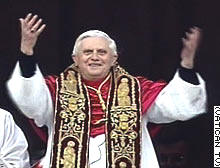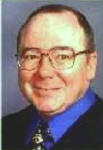.
Tuesday, April 19, 2005
GERMAN CARDINAL
RATZINGER
ELECTED AS 265TH POPE
Cardinal
Ratzinger Known For His Uncompromising Stance
By
Michael Ireland
 VATICAN CITY (ANS) -- Cardinal
Joseph Ratzinger of Germany has been elected as the next Pope -- the
head of the world's 1.1 billion Roman Catholics. Taking the name Pope
Benedict XVI, the 78-year-old German has appeared on the balcony of the
Vatican palace to givehis first Papal greeting to the world. (Pictured:
Cardinal Joseph Ratzinger of Germany has been elected as the 265th
Roman Catholic Pope. Credit: Vatican TV). VATICAN CITY (ANS) -- Cardinal
Joseph Ratzinger of Germany has been elected as the next Pope -- the
head of the world's 1.1 billion Roman Catholics. Taking the name Pope
Benedict XVI, the 78-year-old German has appeared on the balcony of the
Vatican palace to givehis first Papal greeting to the world. (Pictured:
Cardinal Joseph Ratzinger of Germany has been elected as the 265th
Roman Catholic Pope. Credit: Vatican TV).
His arrival was greeted by cheers from the many thousands of pilgrims
who had packed St Peter's Square as news of his election spread.
He was chosen on the third round of votes by the 115 cardinals meeting
on the second day of the Conclave to select Pope John Paul II's
successor.
Ratzinger was born into a traditional Bavarian farming family in 1927,
although his father was a policeman. He celebrated his 78th birthday on
April 16.
Ratzinger's studies at the seminary were interrupted during the Second
World War when he was drafted into an anti-aircraft unit in Munich.
His supporters say his experiences under the Nazi regime convinced him
that the church had to stand up for truth and freedom. But his critics
say he stands for suppressing discussion within the church.
Wolfgang Cooper, a commentator on religious affairs in Germany, said
before his election that the cardinal could become a divisive figure.
"I think if Cardinal Ratzinger was pope, a large distance could grow
between the leadership of the Church and the faith," he predicted
before the result was known.
Cooper says the cardinal is a "scientist" who "prefers intellectual
discussions," whereas many Catholics want priests and bishops "who will
touch the hearts."
Cardinal Ratzinger has been a head of the Congregation for the Doctrine
of the Faith -- the Vatican's guardian of orthodoxy since 1981.
As such, he has also taken some uncompromising political positions, for
instance calling for pro-abortion politicians to be denied communion
during the US election campaign, or arguing that Turkey should not be
admitted into the European Union.
As the 265th successor to St Peter, he is expected to give the Church a
clear, if sometimes radical voice.
Cardinal Jorge Arturo Medina Estevez appeared on the balcony of Saint
Peter's Basilica to announce the election of Ratzinger. Estevez made
the announcement to a cheering crowd in St. Peter's Square.
The new pope then appeared on the on the balcony to give his blessing
to the thousands gathered in Saint Peter's Square, the city of Rome and
the world.
In addressing the crowd he described himself as a humble worker in the
vineyard of the Lord and asked the faithful to remember him in their
prayers.
Ratzinger, who took the name Benedict XVI, appeared on the balcony of
St. Peter's Vatican Basilica to greet the people and deliver his first
papal blessing.
Earlier, white smoke rose from a Sistine Chapel chimney and bells rang
Tuesday, signaling the selection of a new pope.
The crowd clapped and waved flags as the smoke began to billow over
Vatican City about 5:50 p.m. (11:50 a.m. ET).
Suspense built as the throng waited for the symbolic ringing of bells,
at which point the crowd broke into a roar of jubilation.
The conclave of 115 cardinals had voted three times previously -- once
Monday night and twice Tuesday morning -- before selecting the new pope.
The cardinals' morning ballots were burned at about 11:50 a.m. (5:50
a.m. EDT).
Chemicals are added to the ballots to turn the smoke white or black.
Pope John Paul II, who died April 2 at age 84, had decreed that white
smoke be accompanied by the ringing of bells, to avoid a repeat of the
confusion after his election in 1978.
Ratzinger needed two-thirds of the votes to be selected.
There has been a great deal of speculation about who may be chosen to
succeed John Paul II, who died April 2 at the age of 84, but cardinals
have been mum.
Some taking part in the conclave said they are looking for a leader who
presents a hopeful vision, who can "generate some dynamism and some
optimism within Catholicism," CNN Vatican analyst John Allen said.
The first clues to the process of finding a successor were sought
during the homily or sermon delivered by Ratzinger at Monday's public
Mass.
"Having a clear faith, based on the creed of the church, is often
labeled today as a fundamentalism," Ratzinger said.
CNN analyst Allen said Ratzinger delivered a "very blunt" message for
the church to "stay true to itself."
That was a strong indication that Ratzinger, 78, wants a
"traditionalist" elected the next pope, Allen said.
John Paul II was widely credited with extending the reach of the
papacy. He spoke more than a dozen languages and set an unprecedented
pattern of pastoral travel, drawing huge crowds all over the world.
He was also strictly traditional on issues of sexuality and the role of
women in the church, which won him support among some Catholics but
alienated others. Similar disagreement exists over the next pontiff's
stances on issues such as birth control, stem cell research and the
ordination of female priests.
**This article was compiled using news sources
such as the BBC, CNN, and VOA.
| ** Michael Ireland
is an international British freelance journalist. A former reporter
with a London newspaper, Michael is the Chief Correspondent for ASSIST
News Service of Garden Grove, CA. Michael immigrated to the United
States in 1982 and became a US citizen in Sept., 1995. He is married
with two children. Michael has also been a frequent contributor to UCB
Europe, a British Christian radio station. |
 |
|
Thanks
for visiting ACROSS
|
|